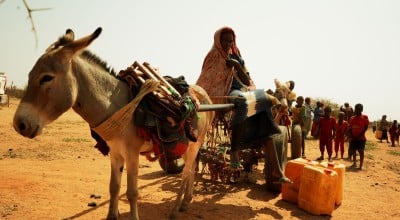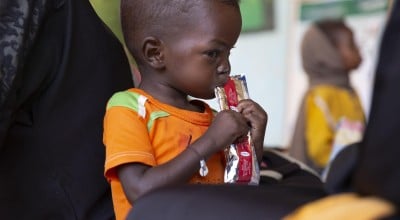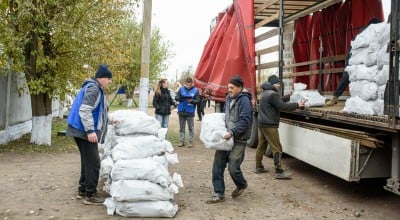
Read our 2024 annual report

Knowledge Hub
As COVID-19 continues to spread, concern is growing around the potential impact of an outbreak among the 900,000 Rohingya refugees living in Bangladesh.
In August 2017, hundreds of thousands of Rohingya refugees fled from a sustained campaign of violence in Myanmar’s Rakhine State and now live in a refugee camp in the Cox’s Bazar region of Bangladesh.
Many families risked their lives and walked for over 16 days to reach a place of safety but now, it looks as if their biggest challenge could still lie ahead.
The global outbreak of COVID-19 has now reached Bangladesh, with the World Health Organisation WHO confirming this week that there have been 49 confirmed cases of the infection in the country.
One of these cases was in the seaside village of Cox’s Bazar, a bustling epicentre of humanitarian activity just over 33km from the Rohingya refugee camp.
Lives at risk
Given the high-density of the camps, where 855,000 people live on a site spanning 24 square kilometres, there is a huge risk that COVID-19 will spread rapidly if it enters the community.
The site is built on hilly terrain and is made up of tents built from bamboo and tarpaulin, which are packed extremely close together and usually house several family members in one room – leaving no opportunity to follow self-isolation guidelines.
Hygiene facilities, for example handwashing station are shared with multiple households; making infection control and social distancing impossible. In addition, according to a report by ACAPS, over 10% of households have at least one individual above the age of five with a disability or chronic illness.
The environment within the camp is, unfortunately, highly conducive to the spread of the virus.
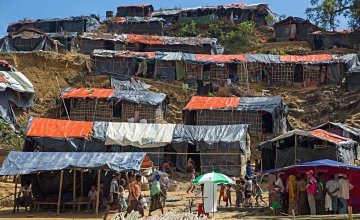
There have been more than 174,000 reported cases of Acute Respiratory Infection (ARI) since January 2020 and, although COVID-19 is a different respiratory disease, the fear is that it will multiply just as quickly once it gets to the camps.
National shutdown
Like many countries, the Bangladesh government has imposed a nationwide shutdown until April 11 in an attempt to contain the spread of COVID-19 and Concern is committed to fully observing these measures while still supporting the Rohingya community in any way possible.
Prior to the outbreak, Concern was supplying food rations to vulnerable families within the camp, as well as operating six fully integrated nutrition sites, which includes guidance and information to mothers and children around nutrition.
With restrictions imposed on movement up to 11 April, our team in Cox’s Bazar distributed a double ration of food to the Rohingya community ahead of the closure to ensure families had adequate provisions.
We have also prepositioned food stock in the camps that can be distributed by our volunteer network should the lockdown continue for a longer period.
Lucia Ennis, Concern’s Regional Director for Asia, explains that the key focus at present is to ensure the safety of staff and ensure that our operations do not contribute to the spread of the disease.
"The main focus is ‘do no harm’. We're totally committed to our humanitarian mandate but have also directed staff to honour the restrictions put in place by the government,” she said.
With only essential frontline staff providing essential services which includes health, nutrition and food distribution permitted in the camp, we have had to redesign our nutrition services.
To ensure that we do not bring groups together and minimise contact, we have suspended some of the training and communal services, and increased awareness campaigns on hygiene promotion and infection control.
Lucia is confident that there will no adverse impact in the short-term, as the centres were now focused on less acute nutrition support. However, as the situation evolves, we do foresee an increase in severe acute cases of malnutrition being presented and we will prioritise our services to support these cases.
Taking action
Concern continues to support the Rohingya community, and Lucia explains we are adapting our programme and that taking serious measures now to minimise the spread of COVID-19 within the camps will save lives further down the line.
"You have a very small localised area with a high density population, and for Concern - and the international community – the first consideration has to be not to make it worse and not to bring in the virus.
“I think we'll end up working much closer with the health sector and helping to raise awareness of the ways to stop the spread of COVID-19.”
The situation is evolving rapidly and we have dedicated trained teams on the ground who are adapting and responding in coordination with the nutrition and health sectors.
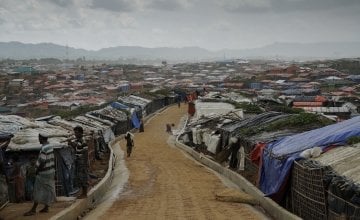
We currently do a lot of our work through volunteers within the Rohingya community and are heavily involved in community dialogue. This is an important avenue for messaging around COVID-19 to reach the wider community.
"For now, we're doing hygiene awareness messaging through the distribution of leaflets and have reduced the doing door-to-door visits while the government tries to contain things," explains Lucia.
Miscommunication
The use of social media and messaging apps is widespread across Bangladesh and this could provide a key platform for raising awareness as things progress.
The worry persists, however, that misinformation will spread throughout the camp and, according to the ACAPS report, the virus is already being perceived as being more deadly than its actual mortality rate.
Due to false misinformation and messaging platforms, some even believe that anyone with COVID-19 must be killed in order to stop the virus from being transmitted.
Should this false narrative take hold, it has the potential to make the spread of COVID-19 even more widespread as those with symptoms of the virus try to keep their illness secret.
With so many mixed messages, tensions are rising and the threat of violence looms over the camps as health workers and authorities struggle to get accurate information on self-isolation through to the community.
Ongoing commitment
We currently have a team of 175 staff working in the camps, along with 250 volunteers from the Rohingya community and local residents in Cox’s Bazar.
Concern’s staff will stay in Cox's Bazar, while respecting the government's mandate on restricted movement over this period, and we are well positioned to adapt our response as the situation progresses.


